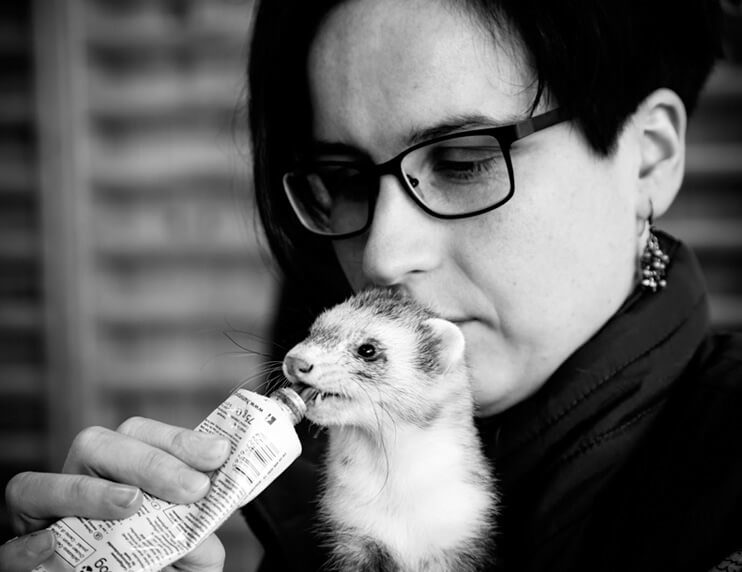Ferret News
After Your Ferret Is Diagnosed with Insulinoma
By Dr. Linda Viteznikova

If your ferret is diagnosed with insulinoma, you’re not alone. It’s a common condition in which tumors on the pancreas cause an increase in insulin, leading to hypoglycaemia (very low blood sugar). Surgery is often not a good option for ferrets with insulinoma because there is a severe concurrent systemic disease, poor general health, or because the risks of surgery are not worth the potential benefit. When this is the case, we need to focus on the medical treatment of hypoglycaemia. Our goal is to decrease the frequency and severity of the hypoglycaemia symptoms with medication. In this case, the main indicators of successful therapy are fewer hypoglycaemic episodes, gaining weight, a willingness to eat, etc.
Medication therapy is always progressive and the course of therapy follows the progress of the disease. If there are signs of increased hypoglycaemia, then increased therapy is needed. Successful treatment includes a combination of good nutrition and feeding habits and medication.
NUTRITION
It is essential that ferrets with insulinoma get food that is high in fat and animal proteins. The ferret should have access to the food at any time of day or night. If the ferret is suffering from anorexia or is not eating enough, then you should feed your ferret by hand or syringe every 4-6 hours.
Hypoglycaemic ferrets should not have food or treats that are high in carbohydrates because this can stimulate the pancreas too much and cause a sudden release of insulin in the blood, worsening their hypoglycaemia.
If your ferret is not receiving a diet high in fat, high in animal protein, and low in carbohydrates at the time of diagnosis, it is important to change their diet as soon as possible to improve their outcome.
MEDICATION
One common drug used to treat insulinoma is steroid hormones known as glucocorticoids, such as Prednisone. These hormones are originally produced by the adrenal glands and they function to metabolise lipids, proteins, and carbohydrates. Glucocorticoids are used to help increase glucose and glycogen synthesis in the liver in a hypoglycaemic ferret.
Glucocorticoids can have serious side effects in the long term, including enlargement of the abdomen, worsening of hair quality, and hair refusing to grow back when it has been clipped. Some side effects that are common in dogs have not been observed in ferrets: Polyuria (increased urination), polydipsia (increased water intake), and polyphagia (increased food intake).
Another drug used to treat insulinoma is diazoxide (Proglicem) which increases the glucose level in the peripheral blood by decreasing the insulin release from the cells of the pancreas. Side effects seen in dogs and humans have not been seen in ferrets; while some patients on diazoxide have developed cataracts, it’s not clear if there is a causal relationship.
FOLLOW UP
After 1 or 2 weeks of taking medications, it is recommended that your ferret see a vet who can evaluate their progress by measuring their glucose level and getting information from you about the ferret’s activity level, food intake, and the reduction of any signs of hypoglycaemia. After the ferret has stabilised, you should take her for check-ups every 2 months.
PROGNOSIS
The medical treatment of hypoglycaemia can be effective in controlling symptoms for approximately 6-18 months. The prognosis may be worse if there were symptoms of hypoglycaemia for a long period before treatment was started. When it comes to insulinoma, the “wait and see” approach will harm your ferrets and markedly worsen their chances. If you believe your ferret may have insulinoma or shows symptoms such as lethargy, weight loss, decreased food intake, increased salivation, collapse, or seizures, take them to the vet. Insulinoma signs can come and go, so even if the symptoms subside, it’s important to get them checked out and rule the illness out.




